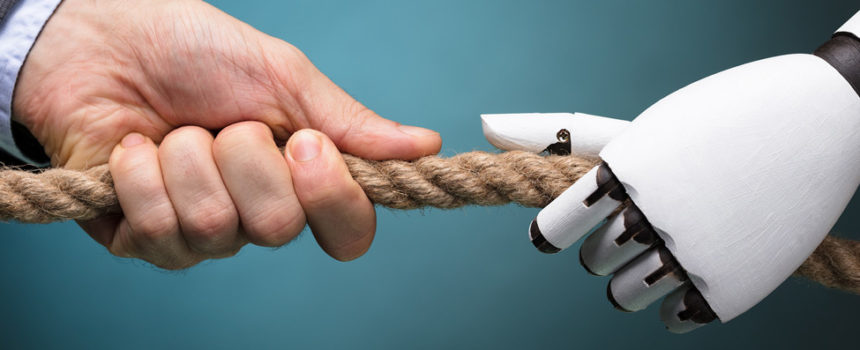In the discussion of automation and machine learning, there is certainly one crucial question, for sales and for everyone: is the future dominated by humans or machines? Or, both together in harmony?
I truly believe there will be such a decision, and it will have to be made in the not-too-distant future. As we discussed in our last article, humans can be sloppy, late, incorrect, inconsistent, and—in comparison to machines—only work part of the time. For that reason we know we’re depending more and more on machines.
Point of No Return
We have reached a point of no return, now, for there are machines today that if we suddenly had to do without would mean the end of an industry. One very important example is agriculture, which is highly automated today. We’re having to feed 7 billion people, and if we suddenly had to go back to manually growing, picking, packing and shipping, the whole industry globally would fall apart. It’s only going to become more automated as time goes by.
In the digital transformation taking place today, there are some industries that will totally vanish. I don’t think people have totally thought through the impact that automation could have for the future—and I’m only raising questions here, not trying to provide answers (which I certainly couldn’t do in the framework of a single article).
We’ve also passed the point of no return when it comes to our personal lives—just look at smartphones. Interestingly, a great deal of our activity with smartphones deals not with interaction with people, but with other machines. Where is the nearest restaurant? Can I book a table? Where can I buy that sweater? Where is the nearest park located? All such questions are directly addressed toward a machine, not a person.
The relationship between smartphone and user has become symbiotic and will become even more so. People freak out if they lose their phones—it’s like they’ve lost a limb or a major organ. Work is already in progress to make a smartphone part of a person’s body.
Migration of Workers
We know we can’t influence which industry or industries will totally vanish as a result of machines. Go back 150 years, and we were in the age of horse-drawn vehicles. Today, such things are kept around mainly for amusement. What will be next? We only know that today a disappearing industry can mean an impact on millions of workers.
When workers are no longer working in an industry, where do they go? When the Industrial Age took over from a primarily agricultural society, many moved out of the field and into the factory. Today, with factories becoming almost completely automated, I believe it’s a question of educating the worker. For the direction the world is heading, you need knowledge—more intelligent people are needed in this increasingly automated society.
An Example of Coming Radical Change
One area that will eventually be heavily impacted by automation is motor vehicles. Self-driving vehicles are now very much on the horizon. Once they fully come to pass, how many millions of jobs will be lost? By truckers? By bus drivers? By taxi (or Uber, Lyft, or other transportation network company) drivers?
Taking an even further step back, if we’re not going to have to drive cars ourselves, why should private individuals have to own them? A car normally sits idle 70 to 90 percent of the time—you drive to work, the car sits for 8 hours, and you drive home. You sometimes go out, to go shopping (although this is becoming unnecessary, too). But even so, most of the time, you don’t actually need the car. A car could be “timeshared” so that it could be used when needed.
Taking this thought process further, this scenario would mean drastic changes to the automotive industry as well, because we would need fewer cars and vehicles, even as the population increases. There would be an enormous reduction in vehicle manufacturing and car dealerships.
It follows we’d also need fewer traffic lights, traffic police officers, even traffic signs. Other industries would radically change and evolve, too, such as driver training—no drivers, no training needed. You can certainly imagine many other changes.
We’re starting to see radical changes in the automotive industry happening already. I saw a very interesting article recently comparing the BMW M3, a high-performance internal-combustion vehicle, to the new Tesla 3 all-electric car. The comparison was shocking. For example, the BMW M3 internal combustion engine costs between $3.5k and $3.7k to build, while the Tesla Model 3 electric engine costs a mere $754. The BMW M3 has 1,200 engine parts, while the Tesla 3 has a mere 50. There are other jaw-dropping comparisons as well. It’s clear where the future is going—and I believe these electric cars won’t have drivers for long.
Understanding Where We’re Going
With the skyrocketing uptake in automation, it’s vital that we all keep a firm grip and understanding on where it is taking us. If you’re in an industry that might, in the end, be totally automated, start now in changing over to a career that is more knowledge-based.
For those of us in sales, as I’ve said earlier, I very much doubt B2B sales will ever be automated–it’s too complex a transaction. If you’re in B2C sales, keep your eyes open, and it might be time to seek a career change.
There is one more very crucial aspect to an automated society—probably the most important facet—which is the question of data and automation bias. We’ll be covering that in our next article in this series.





















Comments (3)
Awesome write up. My advice to everyone as Nikolaus put it “… keep a firm grip and understanding on where it is taking us. If you’re in an industry that might, in the end, be totally automated, start now in changing over to a career that is more knowledge-based.”
Apt! Great article! Spot on.
It is the best speech ever